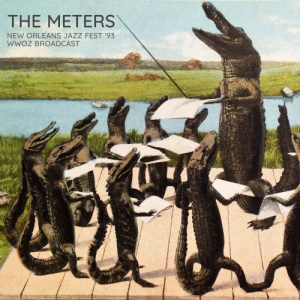Meters, The - New Orleans Jazz Festival 93 (WWOZ Broadcast Remastered) '2020

| Artist | Meters, The Related artists |
| Album name | New Orleans Jazz Festival 93 (WWOZ Broadcast Remastered) |
| Country | |
| Date | 2020 |
| Genre | Soul; Funk; Jazz |
| Play time | 39:24 |
| Format / Bitrate | Stereo 1420 Kbps
/ 44.1 kHz MP3 320 Kbps |
| Media | CD |
| Size | 244 MB |
| Price | Download $1.95 |
Order this album and it will be available for purchase and further download within 12 hours
Pre-order album Tracks list
Tracks list
The Meters defined New Orleans funk, not only on their own recordings, but also as the backing band for numerous artists, including many produced by . Where the funk of and was wild, careening, and determinedly urban, the Meters were down-home and earthy. Nearly all of their own recordings were instrumentals, putting the emphasis on the organic and complex rhythms. The syncopated, layered percussion intertwined with the gritty grooves of the guitar and organ, creating a distinctive sound that earned a small, devoted cult during the 70s, including musicians like and , both of whom used the group as a backing band for recording. Despite their reputation as an extraordinary live band, the Meters never broke into the mainstream, but their sound provided the basis for much of the funk and hip-hop of the 80s and 90s. Throughout their career, the Meters were always led by (keyboard, vocals), one of the leading figures of the New Orleans musical community. As a teenager in high school, he recorded the seminal Mardi Gras Mambo with his group, the Hawketts, for Chess Records. The exposure with the Hawketts led to solo contracts with Specialty and Instant, where he released a handful of singles that became regional hits in the early 60s. Around 1966, he formed Art Neville & the Sounds with his brothers and (both vocals), guitarist , drummer Joseph Zigaboo Modeliste, and bassist . The band grew out of informal jam sessions the musicians held in local New Orleans nightclubs. After spending a few months playing under the Sounds name, producer and Marshall Sehorn hired the group -- without the vocalists -- to be the house band for their label Sansu Enterprises. As the house band for Sansu, the Meters played on records by , , , and , as well as himself. They also performed and recorded on their own, releasing danceable instrumental singles on Josie Records. Sophisticated Cissy and Cissy Strut became Top Ten R&B hits in the spring of 1969, followed by the number 11 hits Look-Ka Py Py and Chicken Strut a year later. The Meters stayed at Josie until 1972, and during that entire time they reached the R&B Top 50 consistently, usually placing within the Top 40. In 1972, the group moved to Reprise Records, yet they didnt sever their ties with Sansu, electing to keep as their producer and Sehon as their manager. Ironically, the Meters didnt have nearly as many hit singles at Reprise, yet their profile remained remarkably high. If anything, the group became hipper, performing on records by , , , , and . By the release of 1975s Fire on the Bayou, the Meters had a Top 40 hit with Rejuvenations Hey Pocky A-Way (1974), and they had gained a significant following among rock audience and critics. Fire on the Bayou received significant praise, and the group opened for on the British bands 1975 and 1976 tours. During 1975, the Meters embarked on the Wild Tchoupitoulas project with s uncle and cousin and Amos Landry, two members of the Mardi Gras ceremonial black Indian tribe, the Wild Tchoupitoulas. The Meters, the Landrys, and the Neville brothers -- , , , and -- were all involved in the recording of the album, which received enthusiastic reviews upon its release in 1976. joined the Meters after the records release. Despite all of the acclaim for The Wild Tchoupitoulas, its adventurous tendencies indicated that the group was feeling constrained by its signature sound. Such suspicions were confirmed the following year, when they separated from and Sehorn, claiming they needed to take control of their artistic direction. Following the split, the Meters released New Directions in 1977, but shortly after its appearance, and Sehorn claimed the rights to the groups name. Instead of fighting, the band broke up, with and forming with and , while the remaining trio became session musicians in New Orleans. Modeliste, in particular, became a well-known professional musician, touring with the New Barbarians in 1979 and moving to L.A. during the 80s. The Meters reunited as a touring unit in 1990 with Russell Batiste taking over the drum duties from Modeliste. Four years later, left the band, allegedly because he and disagreed whether the band should be paid for samples hip-hop groups took from their old records; he was replaced by , who had played with . The Meters continued to tour throughout the 90s. ~ Stephen Thomas Erlewine, Rovi Tracklist: 01. The Meters - Africa>They All Asked For You>Look-Ka-Py-Py (Live) (Remastered) (10:03) 02. The Meters - Hey Pocky Way (Live) (Remastered) (6:53) 03. The Meters - Fiyo On The Bayou (Live) (Remastered) (11:03) 04. The Meters - People Say (Live) (Remastered) (11:25)
Related artists
Meters, The
Album
- 2020 Gettin' Funkier All The Time: The Complete Josie / Reprise & Warner Recordings 1968-1977
- 2020 New Orleans Jazz Festival 93 (WWOZ Broadcast Remastered)
- 2019 The Complete Albums 1969-1977
- 2016 A Message from The Meters: The Complete Josie, Reprise & Warner Bros. Singles 1968-1977
- 2011 Here Comes The Meter Man: The Complete Josie Recordings 1968–1970
- 2005 Rhino Hi-Five: The Meters
- 2005 The Essentials: The Meters
- 1997 / 2005 The Very Best of the Meters
- 1974 Rejuvination
- 1970 [1999] Struttin
